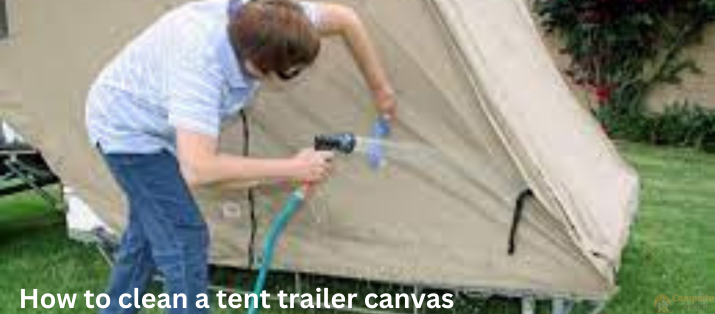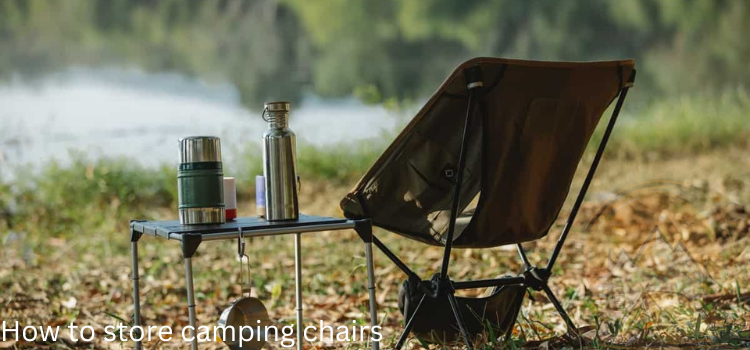Cleaning the canvas of your tent trailer is an important maintenance task to ensure its longevity and to keep it looking fresh for your outdoor adventures. Over time, dirt, grime, and mildew can assemble on the canvas, compromising its durability and appearance. By following a few simple steps and using the right techniques and products, you can effectively clean your tent trailer canvas and improve its lifespan.
Regular cleaning not only enhances your tent trailer but also helps prevent mold and mildew growth, which can cause health issues and damage to the fabric. Whether you’re a seasoned camper or new to the world of tent trailers, understanding how to properly clean the canvas is key to maintaining your investment and enjoying many more camping trips in the future. So, let’s start into the step-by-step process of cleaning your tent trailer canvas to ensure it remains in top condition for years to come.

Why it’s important to clean your tent trailer canvas:
Regularly cleaning your tent trailer canvas is important for several reasons. Firstly, collect dirt, grime, and debris can degrade the fabric over time, leading to earlier wear and tear. By keeping the canvas clean, you help preserve its integrity and extend its lifespan, ultimately saving you money on costly repairs or replacements.
Moreover, neglected canvas is prone to mold and mildew growth, especially in damp or humid environments. Mold and mildew not only cause unsightly stains but also emit unpleasant odors and can compromise the structural integrity of the canvas. Cleaning your tent trailer canvas removes mold spores and prevents their proliferation, ensuring a safe and healthy camping environment for you and your family.
Additionally, maintaining a clean canvas enhances the overall appearance of your tent trailer, contributing to a more enjoyable camping experience. A fresh and well-maintained canvas reflects positively on your attention to detail and care for your outdoor equipment. Plus, a clean canvas is less likely to attract pests such as insects or rodents, reducing the risk of damage to your trailer and belongings. Overall, regular cleaning is essential for preserving the functionality, aesthetics, and longevity of your tent trailer canvas.
Supplies Needed for Cleaning a Tent Trailer Canvas:
Before you begin cleaning your tent trailer canvas, gather the necessary supplies to ensure a thorough and effective cleaning process. Here’s a list of important items you’ll need:
Mild Soap or Canvas Cleaner:
Choose a gentle, non-abrasive soap specifically designed for cleaning canvas materials. Avoid harsh chemicals or detergents that can damage the fabric.
Soft-Bristled Brush:
Brush with soft bristles to scrub away dirt and stains without causing abrasion or tearing to the canvas. A brush with a long handle will make it easier to reach all areas of the tent trailer canvas.
Water Hose or Bucket:
You’ll need a source of water for rinsing off soap and debris from the canvas. A garden hose with a spray nozzle attachment is ideal for thorough rinsing, but a bucket of water can also suffice for spot cleaning.
Soft Cloth or Sponge:
Use a soft cloth or sponge to apply soap to the canvas and gently scrub away stubborn stains. Avoid using abrasive materials that can scratch or damage the fabric.
Stain Remover (Optional):
For tough stains or mildew spots, you may need a specialized stain remover formulated for canvas fabrics. Follow the manufacturer’s instructions carefully when using stain remover products.
Waterproofing Spray (Optional):
After cleaning and drying the canvas, consider applying a waterproofing spray to enhance its water resistance and protect it from moisture damage during future camping trips.
Step-by-step guide on how to clean a tent trailer canvas:
By following these step-by-step guidelines and tips, you can effectively clean your tent trailer canvas and maintain its appearance and durability for years of outdoor adventures.
Pre-cleaning Preparation:
Before diving into the cleaning process, it’s necessary to prepare your tent trailer canvas. Start by selecting a suitable location for cleaning, preferably outdoors in a well-ventilated area. Ensure that your tent trailer is fully set up, with all zippers, windows, and doors closed to prevent water from seeping inside during cleaning. Remove any loose debris or dirt from the canvas using a soft brush or broom.
Cleaning Supplies Needed:
Gather the necessary supplies for cleaning your tent trailer canvas. You will need a mild detergent or specially formulated canvas cleaner, a soft-bristled brush or sponge, a bucket of water, a hose or spray bottle for rinsing, and a clean cloth or towel for drying. Additionally, consider using a vinyl cleaner for any vinyl components of your tent trailer, such as windows or awnings.
Cleaning Process for Vinyl and Canvas Materials:
Start by mixing the mild detergent or canvas cleaner with water in the bucket according to the manufacturer’s instructions. Dip the soft-bristled brush or sponge into the cleaning solution and gently scrub the canvas in a circular motion, working from top to bottom. Pay special attention to areas with stubborn stains or mildew growth, applying slightly more pressure if needed.
For vinyl components, such as windows or awnings, use a separate cleaning solution specifically designed for vinyl surfaces. Apply the vinyl cleaner to a clean cloth and wipe down the vinyl surfaces, ensuring thorough coverage. Avoid using abrasive cleaners or harsh chemicals that may damage the vinyl material.
Once you’ve cleaned the entire canvas and vinyl components, rinse thoroughly with water using a hose or spray bottle. Make sure to remove all traces of cleaning solution to prevent residue buildup. Allow the canvas to air dry completely before folding or storing your tent trailer to prevent mold or mildew growth.
Drying and storing your tent trailer canvas:
Once you’ve completed the cleaning process for your tent trailer canvas, proper drying and storage are essential to prevent mold, mildew, and damage. Follow these steps to ensure your canvas remains in optimal condition:
Air Dry Thoroughly:
After rinsing off the cleaning solution, allow the tent trailer canvas to air dry completely. Choose a sunny and well-ventilated area for drying to expedite the process. Ensure that all sections of the canvas, including folds and seams, are thoroughly dried to prevent moisture buildup.
Avoid Folding When Damp:
Never fold or store the tent trailer canvas while it’s still damp or wet. Moisture trapped in the fabric can lead to mold and mildew growth, causing unpleasant odors and potential damage. Wait until the canvas is completely dry before proceeding with folding and storage.
Fold Carefully:
When folding the canvas, take care to fold it neatly and avoid creases or sharp bends. Creases can weaken the fabric over time, leading to tears or deterioration. Follow the manufacturer’s recommendations for folding your specific tent trailer model to ensure proper storage and longevity.
Store in a Dry Location:
Choose a dry and well-ventilated storage area for your tent trailer canvas. Avoid storing it in damp or humid environments, such as basements or garages, as this can promote mold and mildew growth. Ideally, store the canvas in a breathable storage bag or container to protect it from dust and debris.
Consider Using a Dehumidifier:
If you live in a particularly humid climate or anticipate storing your tent trailer for an extended period, consider using a dehumidifier in the storage area. A dehumidifier helps reduce moisture levels, preventing mold and mildew growth and preserving the integrity of the canvas.
Regular Inspection:
Periodically inspect your tent trailer canvas during storage for any signs of mold, mildew, or damage. If you notice any issues, address them promptly to prevent further deterioration. Additionally, consider reapplying waterproofing treatment to the canvas as needed to maintain its water resistance.
By following these guidelines for drying and storing your tent trailer canvas, you can prolong its lifespan and ensure it remains in top condition for your future camping adventures. Proper care and maintenance of your canvas will contribute to a more enjoyable and hassle-free outdoor experience.
Maintenance tips to keep your tent trailer canvas in top condition:
To ensure your tent trailer canvas stays in optimal condition and continues to provide reliable shelter during your outdoor adventures, follow these maintenance tips:
Regular Cleaning:
Make a habit of regularly cleaning your tent trailer canvas after each camping trip or as needed, especially if it’s exposed to dirt, debris, or environmental factors like rain or pollen. Routine cleaning helps prevent the buildup of grime, mold, and mildew, preserving the fabric’s integrity and appearance.
Inspect for Damage:
Before each use, inspect the tent trailer canvas for any signs of damage, such as tears, punctures, or worn seams. Address any issues promptly to prevent them from worsening and compromising the effectiveness of your shelter. Repair small tears or holes using a patch kit designed for canvas materials.
Apply Waterproofing Treatment:
Periodically apply a waterproofing treatment to the tent trailer canvas to enhance its water resistance and protect it from moisture penetration. Follow the manufacturer’s instructions for the appropriate type of waterproofing product and application method based on the canvas material.
Store Properly:
When not in use, store your tent trailer canvas in a dry, well-ventilated location away from direct sunlight and moisture. Avoid folding or storing the canvas while it’s damp, as this can promote mold and mildew growth. Use a breathable storage bag or container to protect the canvas from dust and debris.
Ventilate:
Ensure proper ventilation inside the tent trailer during use to prevent condensation buildup, which can contribute to mold and mildew growth on the canvas. Keep windows, vents, and doors open when weather conditions permit to allow airflow and reduce humidity levels inside the shelter.
Avoid Harsh Chemicals:
When cleaning your tent trailer canvas, avoid using harsh chemicals or abrasive cleaners that can damage the fabric’s waterproof coating or cause discoloration. Stick to mild detergent or specially formulated canvas cleaners recommended by the manufacturer to preserve the canvas’s quality and longevity.
Protect Against UV Exposure:
Minimize prolonged exposure to direct sunlight, as UV rays can weaken the fabric and cause fading over time. Consider using a UV protective spray or applying a fabric guard with UV inhibitors to shield the canvas from sun damage and extend its lifespan.
By following these maintenance tips, you can ensure your tent trailer canvas remains in top condition, providing reliable shelter and comfort for many camping seasons to come. Regular care and attention to detail will help preserve the integrity and longevity of your outdoor shelter investment.
Common mistakes to avoid when cleaning a tent trailer canvas:
While cleaning your tent is essential for maintaining its longevity and performance, it’s important to be mindful of common mistakes that can inadvertently damage the fabric or compromise its waterproofing. Here are some key pitfalls to avoid when cleaning your tent:
Using Harsh Chemicals:
One of the most common mistakes is using harsh or abrasive cleaning agents on your tent fabric. Chemicals like bleach, ammonia, or strong detergents can degrade the waterproof coating, weaken the fabric, and cause discoloration. Stick to mild, non-abrasive cleaners specifically formulated for outdoor gear to protect the integrity of your tent.
Machine Washing or Dry Cleaning:
Avoid machine washing or dry cleaning your tent, as these methods can be too harsh and may damage the fabric, seams, and waterproof coatings. The agitation and heat from washing machines and dryers can cause abrasion, tearing, or delamination of the tent materials. Instead, opt for hand washing using gentle techniques.
Using a Pressure Washer:
While it may seem convenient, using a pressure washer to clean your tent can be incredibly damaging. The high-pressure water stream can puncture the fabric, tear seams, and strip away waterproof coatings. Stick to gentle hand washing with a soft brush or sponge to avoid causing unnecessary damage.
Neglecting to Rinse Thoroughly:
Failing to rinse your tent thoroughly after cleaning can leave behind residue from cleaning agents, which can attract dirt and compromise the fabric’s waterproofing. Always rinse the tent several times with clean water to ensure all traces of soap or detergent are removed.
Not Allowing Sufficient Drying Time:
After cleaning, it’s essential to allow your tent to air dry completely before packing it away. Folding or storing a damp tent can promote mold and mildew growth, leading to unpleasant odors and potential damage. Ensure the tent is completely dry, both inside and out, before storing it.
Scrubbing Too Aggressively:
While it’s important to remove dirt and stains, avoid scrubbing the tent fabric too aggressively, especially if it’s made of delicate materials like silnylon or lightweight polyester. Overly vigorous scrubbing can weaken the fabric, cause abrasion, and compromise its waterproofing.
Ignoring Manufacturer Recommendations:
Every tent is unique, so it’s crucial to follow the manufacturer’s specific care instructions for cleaning and maintenance. Ignoring these guidelines can void warranties and lead to unintended damage. Consult the tent’s manual or contact the manufacturer for advice if you’re unsure about the appropriate cleaning methods.
By avoiding these common mistakes and adopting gentle, careful cleaning techniques, you can effectively clean your tent without risking damage to the fabric or waterproofing. Proper maintenance will help extend the life of your tent and ensure many enjoyable camping adventures to come.
Conclusion:
Maintaining a clean and well-maintained tent trailer canvas is important for ensuring its longevity and your own comfort during camping trips. By following the steps outlined in this guide, you can easily remove dirt, stains, and mold from your canvas without damaging it. Regular cleaning of your tent trailer canvas will not only extend its lifespan but also ensure that you have a pleasant and enjoyable outdoor experience every time. Keep these tips in mind on your next camping trip to keep your tent trailer looking as good as new.
FAQS:
What is the best cleaner for tent trailer canvas?
In a bucket, combine a solution of mild soap and warm water. Working with little areas at a time, gently scrub the canvas with a delicate brush or sponge dipped in the solution.
How do you clean a tent with vinegar?
Half a teaspoon of dish soap and a pint of vinegar should be added to five quarts of boiling water. Apply a little coating of this mixture to all impacted areas of the tent. If the stain is especially stubborn, scrape it off with a soft-bristled brush.
What is the best soap to wash an enclosed trailer?
There are several of cleaning products for aluminum trailers, but for unpainted aluminum, dish soap, Simple Green, or similar products work great. Use car-wash soap if your trailer is painted in order to preserve the sheen of the paint.







That is very fascinating, You are a very skilled blogger.
I have joined your rss feed and look ahead to seeking more of your great post.
Additionally, I’ve shared your website in my social networks
Wow, amazing blog layout! How long have you been blogging
for? you make blogging look easy. The overall look of your site is
magnificent, as well as the content!
Thanks for sharing this amazing list of Free Nude Cams sites! I can’t wait to explore them all